Australia’s Sunday Telegraph Publishes Sun Yang FINA Doping Panel Report In Full, English – & Mandarin
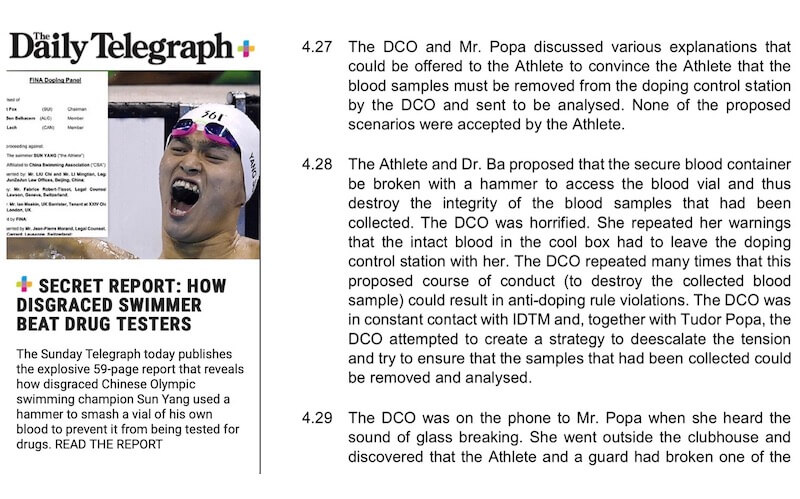
Sun Yang, the Chinese Olympic swimming champion heading for a Court of Arbitration ruling that could either end his career or salvage it after he contributed to the smashing of a vial of his blood during an out-of-competition test, will arrive at the World Championships in Korea this week to widespread calls from within the swimming community for him to be served a lifetime ban.
The first day of racing and the first gold-medal final in the pool on Sunday July 21, will feature Sun as he defends the 400m freestyle title against a backdrop of acrimony and questions over why the CAS case could not be heard before the World Championships in Gwangju.
The details of a previously unpublished report uncovered through investigations conducted by the Sunday Times in Britain, which espoused the details of the report and the Sun Yang controversy back in January, and the Sunday Telegraph in Australia are laid out in coverage of the controversy this weekend. Swimming World has also seen the report in full and brings you some of the concerning detail of that below.
Feelings are running so high in Australia that the country’s Sunday Telegraph has had the entire 59-page report of the FINA Doping Panel hearing into the latest Sun case – and the accompanying news story and two-page spread in the print edition and online – translated into Mandarin.
Sunday Telegraph editor Michael Carroll made the decision to publish the Sun Yang story and the FINA Doping Panel report in mandarin to explain:
“… why elite swimmers around the world want to see the Chinese superstar banned from the sport. “
You can read the Australian Sunday Telegraph coverage here, for Australian readers and subscribers:
- The story outlining the details of the Sun Yang case, with the .pdf of the full hearing embedded
- The story in Mandarin
- The Report findings in Mandarin
A report was issued to the parties concerned by the Doping Panel of FINA, the international federation, in January. It concluded that Sun had taken “a huge and foolish gamble” on his “entire athletic career” when he shattered testing protocol, left an out-of-competition test environment several times without permission and took part in the destruction of a blood sample already submitted for testing.
Sun and his lawyers argue that he broke no rules but did object to the credentials of members of the testing team who called at his home last year and was not prepared to allow samples to go for testing in such circumstances.
The FINA Doping Panel report sets out the detail of FINA’s position, including reasons why the federation felt obliged to refer the matter to the Doping Panel, and the Athlete’s position.
Despite the extraordinary events of a “lengthy and contentious” dispute between the Sun entourage, including twice-barred doctor Ba Zhen, the swimmer’s mother Ming Yang and a security guard, and testers between 11pm and around 3.15am near Sun’s home in Zhejiang province on September 4 last year, the FINA panel let Sun go free with a series of stern rebukes.
Sun and all three others in the entourage as set out in the previous paragraph are said by FINA and its witnesses to have played a part in the smashing of a vial of blood with a hammer.
After the Sunday Times reported the case, the World Anti-Doping Agency expressed “serious concern” that no penalty had been imposed and took the matter to the Court of Arbitration.
In 2011, the CAS set up office in Shanghai so that a decision could be made on four positive tests involving Brazilian swimmers, including Cesar Cielo, so that the athletes could either be declared free to race or suspended and removed from the World Championships about to get underway in the Chinese city. Cielo and two others were handed warnings, among their arguments a contamination at source beyond their control, and allowed to compete while Vinicius Waked was handed a one-year ban for a second doping offence, having previously served a two-month suspension for a separate drug violation.
In 2019, several months have gone by without a date having been set for a hearing and decision in the Sun case, leaving many swimmers, coaches, parents and fans around the world angry, confused and exchanging criticisms of Sun, his doctor, FINA, its Doping Panel, CAS and WADA on social media, loss of trust and faith in the mix. FINA’s director, Cornel Marculescu, has indicated that the hearing will take place in September, though official responses from the court and parties involved are that no date has been set.
Britain’s Adam Peaty was one of a wave of Olympic champions and medallists protesting Sun’s presence at the sport’s premier event, which got underway in Gwangju this weekend with the first finals in some disciplines. Said Peaty:
“I don’t want to see this guy competing at World Championships or Olympics against my teammates who work extremely hard to get there. Pretty sure neither does anybody else … I’m pretty sure if any athlete did this they wouldn’t be given just a ‘stern warning.”
In response to tweets of frustration from several of the world’s leading freestyle swimmers, including a sarcastic “oh, well…” from James Guy, Britain teammate Peaty noted: “Shouldn’t be “oh well” at the end of the day, we should be lead by the people who govern the sport to have zero tolerance to doping.”
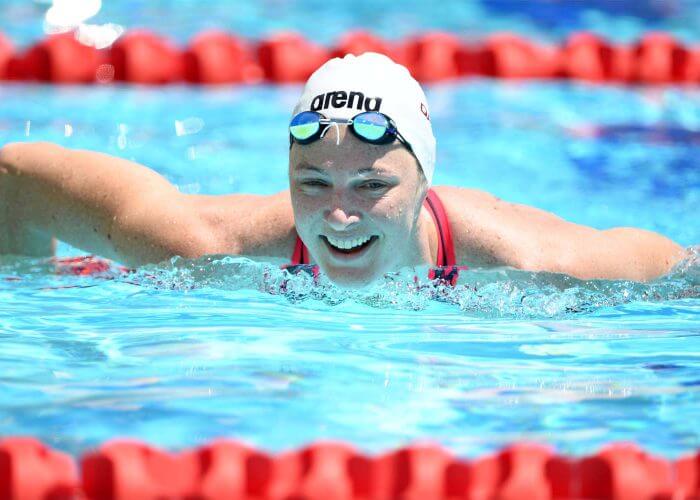
Cate Campbell; Photo Courtesy: Delly Carr/Swimming Australia Ltd.
Cate Campbell echoed the concerns of many of the world’s elite swimmers. “I think that there are some very, very strong questions that need to be asked about the doping situation especially where it pertains to Sun Yang,’’ Campbell told Channel 7.
“It makes me angry. It makes me disappointed. I had the drug testers turn up at 5.30am on a Sunday morning to come test me at my house. I got out of bed and provided a sample of urine and blood. I do that because I believe in clean sport. The thought of smashing a vial with a hammer didn’t even enter my mind. To have someone flaunt the system so brazenly so openly it makes me wonder why I bother and it raises some really serious questions that demand answers.”
Australia’s head coach Jacco Verhaeren quit FINA’s coaching committee in 2017 in protest at the decision to allow Russian swimmers, including one that had twice fallen foul of anti-doping rules and received a penalty on each of those occasions, to compete at the Rio Olympics following the release of the McLaren Report into allegations of state-sponsored doping.
Vladimir Putin, the President of Russia, and Vitaly Mutko, Sports Minister at the time of the McLaren Report, are both recipients of the FINA Order, the federation’s highest honour. Putin received the prize in 2014, while Mutko was given it the year after at the height of the doping crisis and after the ARD German television documentary that helped expose systematic cheating.
The Rio 2016 Olympic Games were the first to witness daily booing and jeering from the athlete stands and crowd each time a swimmer towing a doping record, including Sun and Russian Yuliya Efimova, walked out to their blocks.
Now, Verhaeren fears Sun’s presence in Gwangju will disrupt the championships with past and present swimmers already venting their frustrations on social media. One of the key concerns of swimmers and coaches is that they are being held to a higher standard of accountability in the testing process.
“A case like this surely doesn’t help the reliability and trust in this system,” Verhaeren tells The Sunday Telegraph.
“I think WADA, FINA, IOC, all these parties really need to work hard together to provide more clarity, more transparency. But there’s no mistake that when a drug tester shows up, you make yourself available, there’s no question. There’s also no doubt about what kind of rules there are for things like that, you can’t bend those rules.”
Transparency is helpful, in key regards, to FINA’s argument that it not only took the Sun case seriously but saw clearly what the issues were and understood that action was needed. That action included handing the case to the FINA Doping Panel and then setting out the reasons why it thought Sun had a case to answer.
THE FINA DOPING PANEL REPORT
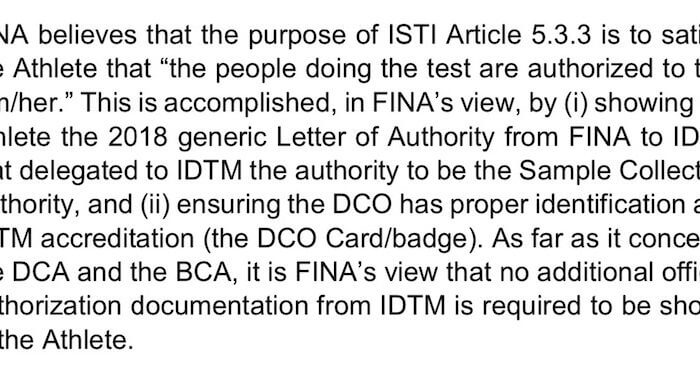
Extract from the FINA Doping Panel report.
Swimming World has had sight of the report in full. The following are some of the key takes from the 59-page FINA Doping Panel report:
The controversial 27-year-old Sun, the first Chinese man to win an Olympic swimming gold and claim that status in all three freestyle events from 200m (2016), 400 and 1500m (2012), had agreed to a window of between 10pm and 11pm on September 4 last year at his athlete’s villa in Zhejiang Province for independent drug testers from International Doping Tests and Management, contracted by FINA, to collect out-of-competition blood and urine samples to test for performance enhancing substances.
Last the outset of presenting the FINA case, the Doping Panel Report includes reference, as reported by The Sunday Times, to previous disagreement between the main testing officer and Sun. In its conclusions, however, the Panel believes that previous incidents should have no bearing on the case and argument before it.
In the mix of the report is the story now told:
Witnesses for FINA:
- The female Doping Control Officer (DCO) who works for IDTM and is not named, by agreement of all parties, and her two assistants, a male Doping Control Assistant (DCA) as urine observer and a Blood Collection Assistant (BCA), a nurse, arrived at the agreed time.
- Sun arrived by car with several family members as the testing window was about to close. His entourage included his mother Ming Yang
- All parties moving to a nearby clubhouse where Sun was to give the samples.
- Sun objected to the accreditation of the assistant (the urine observer) claiming they were not authorised to conduct the testing and insisted he leave the doping control station.
- “The Athlete took pictures of the DCA’s identification card and sent the pictures to unknown persons. The athlete’s mother threatened the DCO, claiming she had police contacts and could determine if the DCA was, in fact, properly authorised to test her son … at the Athlete’s insistence, the DCA was excluded from the doping control station.”
- Sun agreed to provided a blood sample and did so by 11.35pm but again refused to provide a urine sample. He also refused to allow his mother to act as an observer; it was also “proposed by the DCO that the Athlete urinate under the supervision of the DCA but the Athlete could retain custody of the collection vessel. This was also rejected.”
- Sun is then warned that urinating without being chaperoned may be a “refusal violation”. The swimmer insists that is not possible because there is no acceptable DCA present.
- Sun is reminded, according to FINA witnesses, that there is provision on the doping control form to lodge such objections.
- China team doctor Ba Zhen, also one of Sun’s personal doctors, arrives at the clubhouse at 1am.
- Tensions quickly escalate when Dr Ba insists that not only is the DCA rejected but the main Doping Control Officer is also lacking proper accreditation. As such, the doctor refuses to allow any of Sun’s samples to be taken away.
- “The DCO consistently warned the Athlete and Dr Ba that if she did not leave the doping control station with the collected blood containers intact and suitable for analysis, this could constitute an anti-doping rule violation …
- “The Athlete insisted that he was cooperating and would continue to do so and that he would wait at the doping control station until a properly authorised DCA arrived. The DCO refused to countenance this idea.”
- “Sun’s mother asked a guard to bring a hammer into the doping control room.”
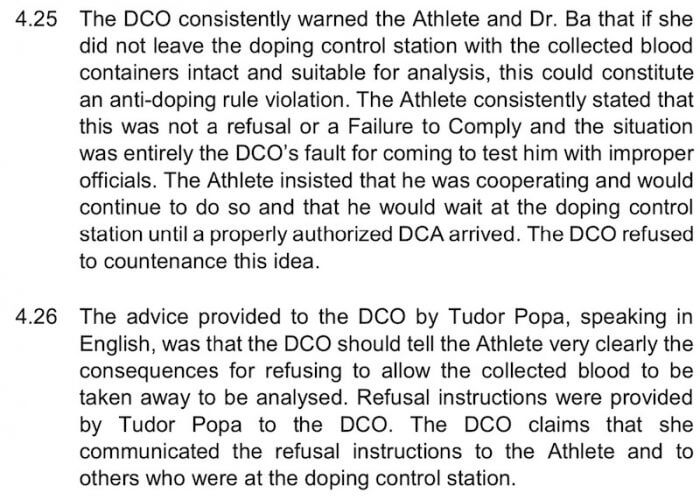
Extract from the FINA Doping Panel report.
Sun and Dr Ba, witnesses claim, then “proposed that the secure blood container be broken with a hammer to access the blood vial and thus destroy the integrity of the blood samples that had been taken.
- After the report notes that “The DCO was horrified”, we read:
- “The DCO was on the phone to Mr. Popa when she heard the sound of glass breaking. She went outside the clubhouse and discovered that the Athlete and a guard had broken one of the secure sample containers with a hammer. The Athlete was beside the guard using his phone as a flashlight. The DCO was asked to destroy the second blood sample container which she adamantly refused to do.”
- “When it was apparent that the collected blood samples had been damaged and could not be taken away by the DCO to be analysed, the DCO attempted to create a paper version of the doping control form to record the events that had transpired. This was suddenly taken by the Athlete without permission and destroyed. Once again, the DCO told the Athlete that such conduct was improper and could result in an anti-doping rule violation.”
- At 3.15am, FINA witnesses tell the Doping Panel, Sun’s mother collected all the “used and unused materials from the testing session, including damaged and used blood tubes, needles and the shredded doping control form and left the clubhouse”.
Sun and his witnesses:

Extract from the FINA Doping Panel report.
Beyond the objections outlined by the FINA witnesses, there was also:
- Sun claims he became suspicious of the DCA and feared they had been “surreptitiously taking pictures and videos of him … This caused the athlete significant concern and sparked his belief that the DCA was not well-trained and could not possibly be appropriately certified …”
- After arriving, Dr. Ba Zhen consults Dr Han Zhaoqi, the deputy director of the Zheijang Anti-Doping Centre, and Cheng Hao, the team leader for the Chinese National Swimming team: those three men conclude that the blood nurse is not sufficiently qualified under Chinese hospital rules and there was no fault when Sun left the main control room on several occasions and “urinated without supervision” because he did so with the DCO’s knowledge. There is no mention, from them, of the permission needed from the DCO.
- Despite the extraordinary events of a fraught night that will end in the FINA Doping Panel issuing Sun with a series of serious rebuke over his conduct, the judges let him walk free on a technicality, namely whether to interpret the term “official documentation” as “singular or plural.
There is no mention the report of a FINA Constitution that lists under definitions:
C 3.21 Whenever the fact or context so requires in order to give effect to the FINA Rules, words in the singular shall include the plural, words in the plural shall include the singular;
- In cautioning Sun, the Doping Panel notes it has “significant concerns regarding the conduct of the Athlete and his entourage” and the decision to clear him “was a close-run thing.”
- Sun’s lawyers maintain he did not break any rules, while the position of witnesses for FINA set out in tyhe report why they believe he did.
In its analysis, the Doping Panel sets out its thinking and the case for and against. Those issues will be critical when the case comes before the CAS.
The FINA Doping Panel issued the following warning to Sun Yang:
A Caution to the Athlete:
- Although not required to decide the case, the Doping Panel feels compelled to point out its very significant concerns regarding the conduct of the Athlete and his entourage. Avoiding an anti-doping rule violation in this matter should not be equated with the Doping Panel condoning such a strategy in future situations. While ultimately successful, it was a close-run thing.
- The Athlete’s success ultimately hinged on the Doping Panel’s interpretation of what “official documentation” was required to be provided by the Sample Collection Authority. The Athlete’s entire athletic career hung in the balance – on what amounted to, essentially, a gamble that the Athlete’s assessment of the complex situation would prevail. That strikes the Doping Panel as foolish in the extreme.
- As many CAS awards have stated, it is far more prudent to comply with the directions of a DCO and provide a sample in every case, even if provided “under protest.” Subsequently, all manner of complaints and comments can be filed, rather than risk any chance of an asserted violation when an aspect of the doping control process becomes a concern. Staking an entire athletic career on being correct when the issue is complex and contentious is a huge and foolish gamble.
- In fact, the Doping Panel rejected many of the Athlete’s contentions and positions as being unfounded and invalid. The Athlete and his entourage were not correct regarding many aspects of the sample collection session. That should be a sobering lesson to the Athlete. The following are but examples;
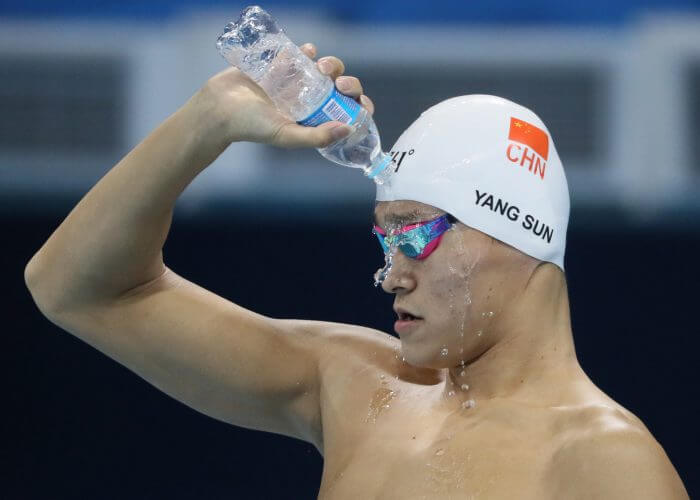
Photo Courtesy: David E. Klutho-USA TODAY Sports
• Signing the Declaration prepared by Dr. Ba was not evidence that the sample collection personnel agreed with its substantive contents. In contrast, it was a form of Report that any athlete may submit at the conclusion of a sample collection session (see ISTI Article 7.4.4). DCOs are instructed to sign any and all such athlete provided comments. Others may sign as a witness. ISTI Article 7.4.6 references the need to have the DCO sign the documentation to confirm that the comments provided by an athlete (or Dr. Ba) reflect the athlete’s concerns – not to confirm that the DCO is in agreement with them.
• The time of the testing mission (commencing at about 11 p.m.) was perfectly appropriate. That it continued so long into the night was unfortunate, but no ground to fault the conduct of IDTM or FINA. This was at the very end of the “60-minute” time period specifically identified by the Athlete when he would be available to be tested. Indeed, the Athlete narrowly avoided a potential Missed Test allegation as he arrived just as the 60-minute time period was ending.
• The Athlete’s entourage continually asserted that the IDTM DCA should have presented to the Athlete DCO accreditation and related authorizations. This is absolutely not required – despite testimony that in China it is standard for all individuals who attend at a sample collection session to be trained as DCOs. In the ISTI, and for all tests performed by other Sample Collection Authorities while in China, it is perfectly proper for DCAs or Chaperones to perform their limited roles and tasks with no DCO accreditation. This so-called “higher standard” claimed by the Athlete’s witnesses is not required in the ISTI, and is absolutely not a justification to refuse to accept the credentials of an otherwise properly authorized DCA, who is not a DCO.
The Doping Panel concludes that Sun Yang “has not committed an anti-doping rule violation under FINA DC 2.3 or FINA DC 2.5.”
The case is now headed for the Court of Arbitration for Sport.




Ban this cheat now.
Sun yung is one of the most decorated swimmer of all time it’s too late now your British swimmers will never come close to sun yung lifetime ban? How many athlete have been banned for life for that same reason? Just try beat sun yung in the pool like every other swimmer…
AsctaNSW Swim Coaches & Teachers this is perfect ?
What’s the point in being ‘the most decorated swimmer of all time’ if your medals are tainted by drugs? All those medals actually mean nothing.
I reckon everybody in the 400 free boycotts from the blocks.. make a stand swimmers… make yourselves heard
Angela Michelle van Heerden that’s not how it works
#cleansports
.
?
Who gets those medals now?
How is it that baseball can get players banned or records thrown out an d swimming can’t do the same to these cheaters… sad day for all the badass athletes that grind the right way to get to the top, don’t let these knuckleheads stop you!!!!
So is he banned from swimming? This is insane!
Alberta Haynes-Carlson why is insane???
Mark Dempsey meaning the doping to get ahead is insane behavior. The article didn’t quite make it clear if he was banned or not, so I was asking in hopes that he was as he deserved to be.
Alberta, insane it certainly feels. FYI the relevant reference in the article on the point you feel is unclear: “Despite the extraordinary events of a “lengthy and contentious” dispute between the Sun entourage, including twice-barred doctor Ba Zhen, the swimmer’s mother Ming Yang and a security guard, and testers between 11pm and around 3.15am near Sun’s home in Zhejiang province on September 4 last year, the FINA panel let Sun go free with a series of stern rebukes.
After the Sunday Times reported the case, the World Anti-Doping Agency expressed “serious concern” that no penalty had been imposed and took the matter to the Court of Arbitration. …. and
In 2019, several months have gone by without a date having been set for a hearing and decision in the Sun case
Summary: FINA DP let him walk free, January; UK Sunday Times ran the story, with details of the smashed vial of blood etc., later that same month; WADA investigated further and believed that worth contesting and took the matter to the Court of Arbitration; the CAS is yet to set an official date; the FINA director has suggested in interviews that the hearing will be in September but official responses are ‘no date yet fixed’; therefore Sun, one doping positive and penalty to his name from 2014, is free to race in Gwangju.
Yassir Abdalla Martin Berbetti Guzmán
Aldo Esteban Castillo sería ejemplar que lo castiguen de una vez. Así como al 90% del equipo chino, acostumbrados por años a engañar vilmente con el abuso de sustancias prohibidas.
Martin Berbetti Guzmán si
Martin Berbetti Guzmán y cuando la piscina de 50 metros pa Gabriel Castillo ??
Erlan Hurtado ese tema se debe encarar entre todos. Dirigentes, padres, nadadores y ex nadadores. Y pedirle a los señores de la Gobernación, que se termine la faltada de respeto con 5 años sin piscina olímpica
Rachel Winterton Sheridan Erskine ?
Ma chi l’avrebbe mai detto
Why need to hide ANYTHING ????!!!!
He’s actually showing all athletes an extreme example of what you need to do when you face procedure injustice.
Come on, anyone read the full report would agree that Sun Yang has a very strong case here. The key is whether the process was legit or not and clearly it was not and hereby the collect blood was not a “sample” , as concluded in the report.
Firstly, the BCA has only nurse certificate instead of nurse practice certificate. only the later one is the qualified to collect someone’s blood sample.
Secondly, the DCA is some random friend of DCO who was excitedly but unprofessionally filming the Athlete.
Thirdly, Sun yang side had himself and four other witnesses in the hearing while no one from FNRA side made themselves available.
so where is the controversy? anyone with no bias will admit that Sun Yang has a stronger case here.
If you are not dirty, you just give the sample regardless – on the other hand if you are dirty and have been caught ‘on cycle’ then you look for any technicality to avoid giving a dirty sample, questioning the bona fides of the collecting officer seems to be an effective tactic.
What would you do if a unqualified doctor trying to operate a brain surgery to you? Will you put your life on someone not procedurally rightful to be there? Guess you can answer that yourself